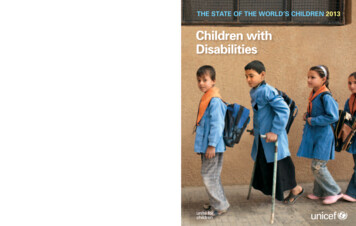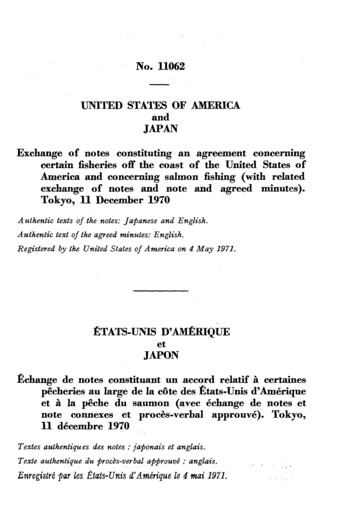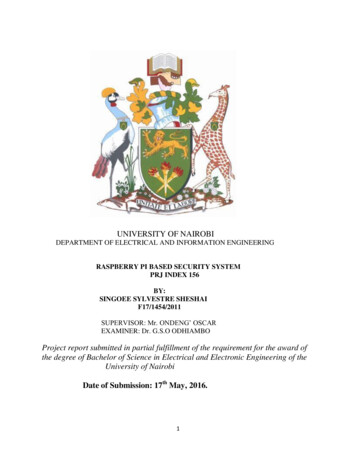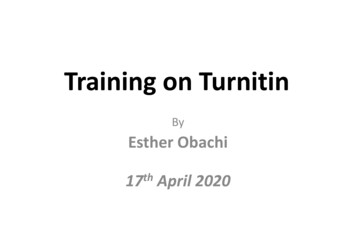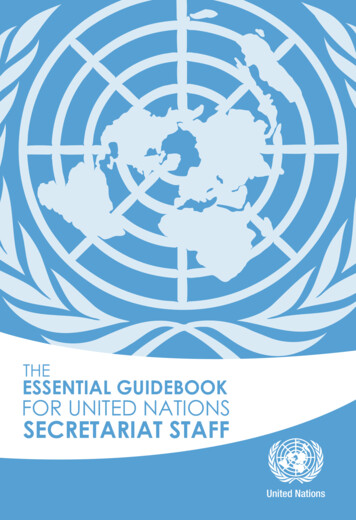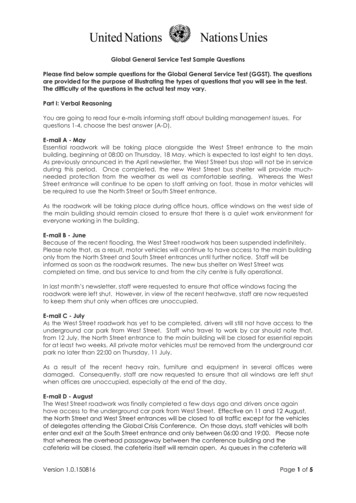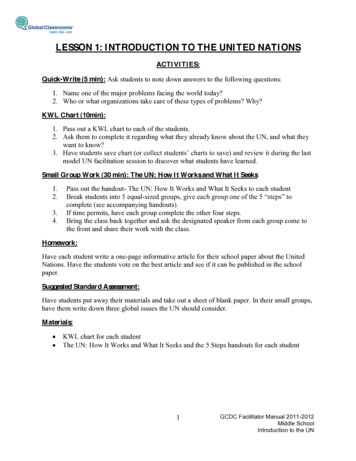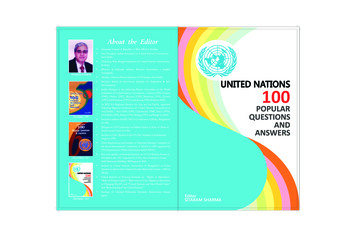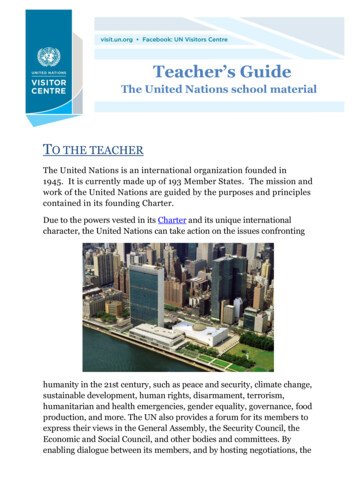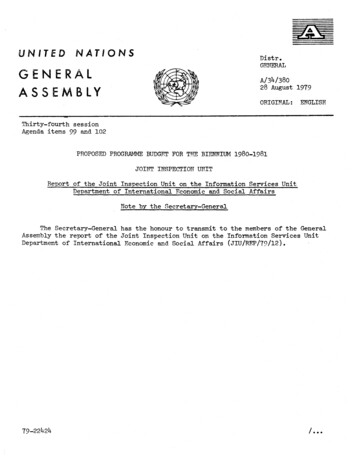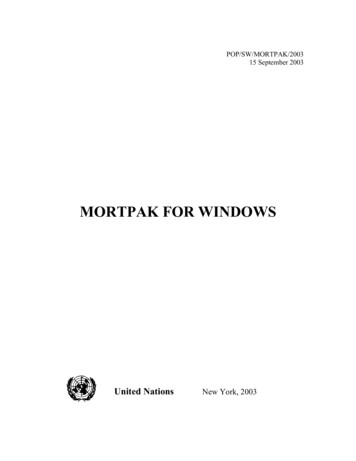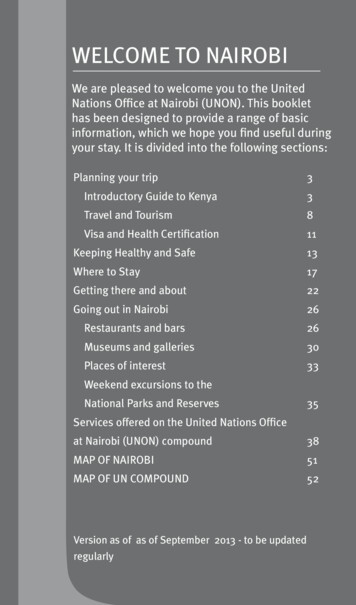
Transcription
Welcome to NairobiWe are pleased to welcome you to the UnitedNations Office at Nairobi (UNON). This booklethas been designed to provide a range of basicinformation, which we hope you find useful duringyour stay. It is divided into the following sections:Planning your trip3Introductory Guide to Kenya3Travel and Tourism8Visa and Health Certification11Keeping Healthy and Safe13Where to Stay17Getting there and about22Going out in Nairobi26Restaurants and bars26Museums and galleries30Places of interest33Weekend excursions to theNational Parks and Reserves35Services offered on the United Nations Officeat Nairobi (UNON) compound38MAP OF NAIROBI51MAP OF UN COMPOUND52Version as of as of September 2013 - to be updatedregularly
Printed at UNON Publishing Services Section, Nairobi, ISO 14001:2004-certifiedPrinted on 100% recycled paper.2YOUR GUIDE TO YOUR STAY IN KENYA
Planning your tripIntroductory Guide to KenyaOfficial nameThe Republic of Kenya. Kenya is named after MountKenya or ‘Kirinyaga’, the ‘Mountain of Whiteness’.Capital city Nairobi (Nyrobi meaning ‘the place ofcool waters’ in Maa). The highest city in East Africa(1700 m), modern and fast growing, Nairobi hasover 4 million inhabitants (estimated).Main citiesMombasa is the coastal capital and the largestport on the East African coast. Other major citiesinclude: Kisumu, Eldoret and Nakuru.AreaKenya covers an area of 583,000 sq km, 13,400kmof which is inland water, including part of LakeVictoria. The coastline is 536 km long.BordersKenya is bordered by Ethiopia, South Sudan,Somalia, Uganda and Tanzania.ClimateNairobi is situated close to the Equator, withan altitude of about 5,500 feet (1700 metres)resulting in an enjoyable equable tropical climate,with temperatures neither uncomfortably low atnight. Mid-October to Mid-December will be theSecondary rainy season.3
The coast is hot with an average daytimetemperature of 27-31 degrees centigrade whilstthe average daytime temperature in Nairobi is 2126 degrees centigrade. Nairobi can become coldenough for coats and fleece; July and August markthe Kenyan winter. Temperatures elsewheredepend on altitude. Typically, January-Februaryis dry, March-May is wet, June-September is dry,October-December is wet.EconomyAgriculture employs 80% of the population, contributes20% to GDP and accounts for 50% of export earnings.Tourism is the largest source of income. The industrialbase contributes around 18% of GDP.Population44.4 million (2013 est.), 42.5% of whom are under14 years old, with a growth rate of 2.56%, one ofthe highest in the world. It is estimated that 50% ofthe population live below the poverty line.Ethnic makeupThere are over 40 tribal groups distinguished bytwo major language groups: Bantu and Nilotic. Thelargest tribes of the Bantu are the Kikuyu, Meru,Gusii, Embu, Akamba, Luyha and Mijikenda. Thelargest tribes of the Nilotic are the Maasai, Turkana,Samburu, Pokot, Luo and Kalenjin. A third groupmade up of Cushitic speaking peoples includes theEl-Molo, Somali, Rendille and Galla. The coastalregion is the home of the Swahili people.4YOUR GUIDE TO YOUR STAY IN KENYA
ReligionChristianity, Hinduism, Sikhism, Islam andtraditional beliefs.LanguageEnglish (official), Kiswahili (national), multipleethnic languages (Bantu, Cushitic and Niloticlanguage groups). Literacy: 85% of population overage 15 can read and write.GovernmentKenya is an independent republic with ademocratically elected parliament. The President isboth the Chief of State and Head of Government.Currency exchangeMost hotels offer forex facilities, though sometimesat disadvantageous rates. Forex facilities remainopen at Jomo Kenyatta International Airport dailyfrom 7am to midnight.CurrencyKenya shilling (Ksh); slang ‘bob’; coins: 50cts,KSh1, KSh5, KSh10, KSh20 and KSh40; notesKSh50, KSh100, KSh200, KSh500 and KSh1, 000.Exchange ratesAs a general guide to exchange rates, the followingrates applied as of August 20131 US 87 Kenya shillings1 Euro116 Kenya shillings1 Pound Sterling136 Kenya shillings5
BankingForeign currency can be changed at banks, foreigncurrency bureaux or hotels. Banks in major centresare open from 09.00 to 15.00 Mon-Fri 09.00 to 12.00on the first and last Saturday of each month. Banksin coastal towns open and close half an hour earlier.ATMsATMs are available country wide with 24-houraccess. Most accept international VISA VISA,Barclays, and UNFCU .Credit cardsMajor international cards are accepted. Credit cardfraud occurs in Kenya, as in most other parts of theworld, and the usual precautions should be taken.Travellers’ chequesTravellers’ Cheques are accepted at most banks,bureaux and hotels.TippingTipping is appreciated. Most hotels and restaurantsinclude a 10% service charge.Shopping and business hours08.30 to 12.30 and 14.00 to 17.30 Mon-Sat. Manybusinesses work Saturday mornings.Shopping centresNairobi has a number of large shopping malls,which are recommended for visitors since theyoffer optimum security. Those listed below offer:supermarkets, retail outlets, banks, forex bureaus,restaurants and bars.6YOUR GUIDE TO YOUR STAY IN KENYA
Mobil Plaza, Muthaiga Tel: (020) 3766418Sarit Centre, Westlands Tel: (020) 3740329(Cinema, Health Club)The Junction, Lavington Tel: (020) 3872881(Cinema)The YaYa Centre, Tel: (020) 2713360HurlinghamThe Warwick Tel: (020) 7120876Centre(immediately adjacent to UNON)Village Market Tel: (020) 7122488 (5 minutesfrom UNON, Cinema)TimeGMT 3 all year-round. Kenya maintains an almostconstant 12 hours of daylight. Sunrise is typically06.30 and sunset at 18.45.Electricity220-240 volts AC, with standard 13-amp threesquare-pin plugs.WaterKenyan tap water is not safe to drink. Bottled wateris readily available.Post officesOpening hours are 08.00 to 17.00 weekdays and 09.00to 12.00 on Saturdays. Stamps can be purchased atpost offices, stationery and souvenir shops and hotels.MediaThe Kenya Broadcasting Corporation (KBC) hasradio transmission in English, Swahili, Hindi andAfrican languages. The BBC World Service (whichalso transmits on 93.9 FM), Voice of America7
and Deutsche Welle all transmit on short-wavefrequencies. Radio France International transmitson 89.9 FM and China International Radio on 91.9FM. There are several commercial radio stationssuch as Capital FM and Kiss FM. There are alsolocally produced television channels in English andSwahili, and digital satellite TV from South Africa.The two daily English-language newspapers arethe Daily Nation and the Standard. The two Swahilinewspapers are Taifa Leo and Kenya Leo.Travel and TourismFor details on travel and tourism options in Kenya,contact the Kenya Tourist Board. Tel: 254 (0)202711262. Email: info@kenyatourism.org, http://www.magicalkenya.com.The Safety and Communication CentreFor up-to-the minute safety and security advicecontact:Where:Kenya Tourism Federation, KWSComplex, Langata RoadTelephone: Tel 254 (0)20 604767/604729.Mobile:0733 617499 or 0722 745645Tourist 24-hour helplineTel: 254 (0)20 604767/605485National Parks and ReservesKenya’s total wildlife conservation area is 44,359 sqkm or 7.6 % of the total area. The main parks are:Aberdare National Park, Amboseli National Park,Hell’s Gate National Park, Lake Nakuru National8YOUR GUIDE TO YOUR STAY IN KENYA
Park, Meru National Park, Mt Elgon National Park,Mount Kenya National Park, Nairobi National Park,Tsavo East and Tsavo West National Park. One ofthe most popular tourist destinations, the MaasaiMara, is designated a National Reserve. There aretwo major marine parks: Mombasa Marine NationalPark and Malindi/Watamu National Park. Detailson all Kenyan National Parks and Reserves can beobtained from: Kenya Wildlife Service (KWS) Tel: 254 (0) 20 orld Heritage sitesFort Jesus, the Gedi Ruins, Koobi Fora, MountKenya, Hells Gate National Park and the MaasaiMara National Reserve.Historical sitesKenya has over 400 historical sites ranging fromprehistoric fossils and petrified forests, to 14thcentury slave trading settlements, Islamic ruinsand 16th century Portuguese Forts.LandscapeThe landscape of Kenya is distinctly divided intotwo halves - the eastern half which slopes gentlyto the coral-backed seashore, and the westernportion, which rises abruptly through a series ofhills and plateaus to the Eastern Rift Valley. Westof the Rift is a westward-sloping plateau, andthe lowest part is covered by Lake Victoria. Thehighest point in the country is the snow-cappedpeak of Mount Kenya (5,199 m), the second highestmountain in Africa. The coastline extends some 5369
km from the Tanzanian border in the southeast, tothe Somali border in the northeast. The main riversare the Athi/Galana and the Tana. The major lakesare: Lake Victoria, Turkana, Baringo, Naivasha,Magadi, Jipe, Bogoria, Nakuru and Elementeita.FloraKenya’s flora is diverse. Coastal forests containpalm, mangrove, teak, copal and sandalwoodtrees. Forests of baobab, euphorbia and acaciatrees cover the lowlands to an elevation ofapproximately 915 m. Extensive areas of savannahare interspersed with groves of acacia and papyrus,which characterize the terrain from 915 to 2,745meters above sea level. Bamboo and camphor arecommon in the dense rainforest of the eastern andsoutheastern mountain slopes. The alpine zone(above 3,550 meters) contains many Senecio andLobelia plants.FaunaDespite the tremendous losses inflicted by huntingand poaching during the twentieth century, Kenyateems with wildlife. There are 80 major animalspecies ranging from the ‘Big Five’ (elephant, buffalo,rhinoceros, lion and leopard) to tiny antelopes suchas the dik-dik, which is slightly larger than a rabbit. Atleast 32 endemic species are endangered.AvifaunaKenya boasts around 1,137 species of birds.Spotting over 100 bird species in a day is notuncommon.10 YOUR GUIDE TO YOUR STAY IN KENYA
Visa and Health CertificationNote: Information provided in this section is correctas of August 2013.A passport, valid for at least six months, isrequired for entry into Kenya. A valid entry visa isalso required (cost US 50) and may be obtainedin advance from the Kenyan Embassy or HighCommission in your country of origin. In theabsence of either, the British High Commission willgenerally represent Kenya in the issuance of visas.Nationals of the following countries do not requireVisas to enter Kenya:BahamasBarbadosBelizeBotswanaBrunei aicaKiribatiLesothoMalawiMalaysia (For less than30 days stay)MaldivesMauritiusNamibiaNauruPapua New GuineaRwandaSamoaSeychellesSierra LeoneSingaporeSolomon IslandsSouth Africa (For lessthan 30 days stay)St. Kitts and NevisSt. LuciaSt. Vincent and theGrenadinesSwazilandTanzaniaTongaTrinidad & TobagoTuvaluUgandaVanuatuZambiaZimbabwe11
Obtaining a visa upon arrivalVisas can also be obtained upon arrival. The fee isUS 50.Kenyan visas require special advance visa clearanceor referred visas by Kenyan authorities (as ofAugust 2013) for Nationals from the eroonDemocratic People’sRepublic of Korea(Formerly N. neSenegalSomaliSyriaTajikistanVisa information and assistanceFor information and assistance regarding visasplease contact: Travel and Visa Unit, UNON:(762) 3580.Health certificationA yellow fever vaccination certificate is requiredONLY if you are arriving in Kenya from an infectedarea. For advice on vaccinations recommended forvisitors to Kenya, please contact your doctor, orthe UNON Medical Clinic. Telephone: (762) 2267.Emergency Line: (762) 599912 YOUR GUIDE TO YOUR STAY IN KENYA
Keeping Healthyand SafeHealthVaccinationsA number of vaccinations are recommended forvisitors to Kenya (check with a travel clinic inadvance).MalariaMalaria is endemic in tropical Africa andprotection against it is necessary. There arenumerous prophylactics on the market, and it isrecommended that prophylactics be taken. Use ofmosquito nets is also recommended in endemicareas. Furthermore, use of mosquito repellents isrecommended.The malarial risk in NairobiThe risk of contracting malaria in Nairobi (or at anyaltitude above 2,500 m) is minimal. For specifichealth advice, contact the UNON Clinic.General health careAvoid dehydration and exhaustion by drinkingplenty of bottled water. Rest, drink and eat atregular intervals.Avoid sunstroke or sunburn by protecting yourselfwith clothing, hats and ultra-violet barriers.The sun is more powerful at altitude and is capable13
of burning through both cloud and haze. In the caseof heat exhaustion cool yourself with shade and/or cold water, and increase fluid intake. In the caseof a heat stroke, cool yourself with shade and/orcold water; increase fluid intake and contact theemergency medical services, as heat stroke is amedical emergency.HIV/AIDSHIV/AIDS is a serious problem throughout Africa,and an estimated 7- 9 % of the Kenyan populationis HIV positive.Medical insuranceTravellers to Kenya are recommended to obtainmedical insurance prior to arrival. The UN will notassume responsibility for any medical costs incurredby visitors. The Government of Kenya will also notcover any medical expenses incurred by visitors.Personal SafetyGreat efforts have been made of late by the Kenyangovernment to improve the security situation.However since Kenyan society is less affluentthan that of the developed world, ostentatious orcareless displays of wealth or valuables may attractunwelcome attention.Personal possessionsValuable items such as large amounts of cash, andirreplaceable documents should be locked in thehotel room safe. Handbags, cameras and jewelleryare attractive targets for thieves, and streetmuggings can occur at any time of the day or night,14 YOUR GUIDE TO YOUR STAY IN KENYA
especially in Nairobi and Mombasa. Visitors shouldremain alert, and when possible take a taxi ratherthan walking. Never walk at night. Visitors are alsoadvised to ignore the attentions of street children,or of any other persons who may approach themwith unsolicited requests.Security clearanceThe UN in Kenya currently has 8 Security Levels(see map overleaf ). Certain areas may experienceheightened security. For further details pleasecontact the Security Control Room (762) 6666.Sexual assaultImmediately contact the Aga Khan or Nairobi Hospitalemergency rooms (see below) in the case of sexualassault. Both hospitals will provide anti-retroviraldrugs that may prevent transmission of diseases.Treatment should start as soon as possible, and at thevery latest, 24 hours after the event.Hospitals and doctorsThere are many highly qualified doctors, surgeons, anddentists in Nairobi and Mombasa. Lodges and hotels inthe game reserves usually have resident medical staff.Most lodges also have radio or telephone contact withthe Flying Doctor Service in Nairobi.Recommended private hospitals in Nairobi:Nairobi Hospital: Tel: (020) 272 2160Aga Khan Hospital: Tel: (020) 3740000/ 3662000M.P. Shah HospitalTel: (020) 374 2763Nairobi Hospital, Gigiri: Tel: (020) 2845000/600015
‘Flying Doctor’ serviceWhere:Tel:Wilson Airport, Nairobi.24-control centre (020) .orgThe Flying Doctor service specializes in airevacuations and emergency treatment in EastAfrica. Temporary membership is available. Nonmembers may use the doctor services, but mustpay for the cost of the flight.Kenya Security Level AreasStructured Threat AssessmentJuly 8LowSubstantial6Moderate4Moderate16 YOUR GUIDE TO YOUR STAY IN KENYA
Where to StayOne of Africa’s prime tourist destinations and thelongest established Kenya’s tourist infrastructureis well tried and tested. The spirit of Kenya isalso exemplified by its tradition of hospitality.Few people in the world are as welcoming asthe Kenyans. The range of accommodation iscomprehensive ranging from budget travel toluxury hotels. Kenya’s hotels vary enormously inprice and facilities and it is recommended thattravel arrangements be booked through a largerhotel chain.LodgesLodges are located in the national parks and reservesand are usually expensive. The food and facilities,however, are generally of the highest standards.Tented CampsComprising a small selection of permanentlysited canvas tents, which are roofed, pitched on aconcrete base or raised wooden platform, and oftenhave a bathroom to the rear, tented camps havelittle to do with ‘camping’. Most offer a surprisingdegree of luxury with flush toilets, hot and coldrunning water and electricity.Where to stay in NairobiNairobi offers a wide range of accommodationoptions. The following hotels are suggested andhave received UNON security clearance. For furtherdetails on the amenities offered we suggest youvisit the websites of the hotels detailed.17
*** star choicesBoulevard HotelLocation: Between Westlands and the city centreTel: 254 (0)20 227567-9 ttp://www.hotelboulevardkenya.comSilver Springs HotelLocation: Central NairobiTel: 254 (0)20 :http://www.silversprings-hotel.comSixeighty HotelLocation: Central NairobiTel: 254 (0)20 315680/344000Email: o.ke**** star choicesFairview HotelLocation: Central NairobiTel: 254 (0)20 2881000Email: book@fairviewkenya.comWebsite: http://www.fairviewkenya.comFairview Country LodgeLocation: Central NairobiTel: 254 (0)20 /www.countrylodge.co.ke18 YOUR GUIDE TO YOUR STAY IN KENYA
Southern Sun Mayfair NairobiLocation:Tel:Email:Website:Parklands suburb, Central Nairobi 254 020 nn.comJacaranda HotelLocation: Westlands suburbs, Central NairobiTel: 254 (0)20 4448713-7Email: ahotels.comSarova PanafricLocation: Central NairobiTel: 254 020 2714444/2720822Email: ww.sarovahotels.com***** star choicesGrand Regency HotelLocation: Central NairobiTel: 254 (0)20 http://www.grandregency.co.keHilton HotelLocation: Central NairobiTel: 254 (0)20 250000Email:hilton@africaonline.co.keWebsite: http://www.hilton.com19
Intercontinental HotelLocation: Central NairobiTel: 254 (0)20 //www.ichotelsgroup.comNorfolk HotelLocation: Central NairobiTel: 254 (0)20 : http://www.fairmont.comNairobi Safari ClubLocation: Central NairobiTel: 254 (0)20 ://www.nariobisafariclub.comNairobi Serena HotelLocation: Overlooking Central Park, CentralNairobiTel: 254 (0)20 .serenahotels.comPanari HotelLocation: Mombasa Road, close to airportTel: 254 (0)20 www.panari.com20 YOUR GUIDE TO YOUR STAY IN KENYA
Sarova Stanley HotelLocation: Central NairobiTel: 254 (0)20 co.keWebsite:http://www.sarovahotels.comWindsor Golf Hotel and Country ClubLocation:Kiambu, NairobiTel: 254 020 8562300Email:marketing@windsor.co.keWebsite: http://www.windsorgolfresort.comTribe - The Village Market HotelLocation: Limuru rd, Gigiri, Village Market,NairobiTel: 254 020 720 : http://www.africanpridehotels.com/tribeFor more information on hotels and guest houses,please access the link dhotels21
Getting thereand aboutGetting there by AirNumerous international carriers serve Kenya, andNairobi is the hub of the East African region. Kenyahas two international airports: Jomo KenyattaInternational Airport is
barclays, and UNFcU . Credit cards major international cards are accepted. credit card fraud occurs in Kenya, as in most other parts of the world, and the usual precautions should be taken. Travellers’ cheques travellers’ cheques are accepted at most banks, bureaux and hotels. Ti
